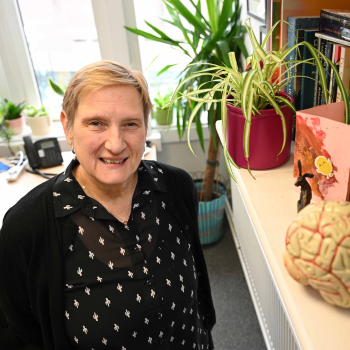Researchers have
been awarded £1.6 million to develop a network which will support people living
with dementia by connecting existing technology and services, as well as developing
new innovations.
Technology has
the potential to transform life for people with dementia by helping them stay
physically, cognitively, and socially active. It can also be used to monitor progression
of the disease and connect those in need of support with relevant services and
resources.
However, there is
currently no coordinated dementia pathway in England or Wales that integrates
technology and services to support those living with the condition.
Now a new
initiative will bring together academics, health professionals, charities,
local authorities, industry, people living with dementia, and their families to
address the current gap by developing solutions that make everyday life more
accessible and independent.
The Technology
Empowered Dementia Independence (TEDI) Network Plus has been funded through the
UKRI Engineering and Physical Sciences Research Council (EPSRC) and the National Institute for Health and Care Research (NIHR), in partnership with the Alzheimer's Society. It is being led by
Professor Arlene Astell of Northumbria University.
A Professor of
Cyber Psychology, Professor Astell will work with colleagues at Newcastle University and the University of Cumbria, as well as NHS Trusts and a wide
variety of stakeholders across the North East and North Cumbria (NENC) region,
including NortHFutures - a digital health hub for the North East and North Cumbria.
With the highest
proportion of people living with dementia per head of population in England, as
well as significant socio-economic challenges, digital inequalities, and rural
accessibility issues, the NENC region will provide the ideal location to
develop and test this new approach.
As the largest integrated
care system in England, serving over 3.1 million people, the region provides a
unique opportunity to demonstrate how a connected life with dementia, supported
by technology, can become a reality.
 Speaking about
what the TEDI Network Plus aims to achieve, Professor Astell explained: “For
many years, I have seen the potential of technology to improve the lives of
people with dementia, but there has been a persistent gap in getting these
innovations into homes and daily routines.
Speaking about
what the TEDI Network Plus aims to achieve, Professor Astell explained: “For
many years, I have seen the potential of technology to improve the lives of
people with dementia, but there has been a persistent gap in getting these
innovations into homes and daily routines.
“Unlike medical
devices that can be easily accessed through the NHS, many assistive
technologies that could support independence – such as tools for managing
finances, transportation, or home safety – lack a structured distribution
pathway.
“TEDI Network
Plus seeks to change this by connecting stakeholders and ensuring that
practical solutions reach those who need them most.”
Over the next
three years, TEDI Network Plus will focus on three key objectives. The first is
to identify gaps in the current system by mapping out the life course of a
person living with dementia in the NENC region. This will highlight
interactions with services such as hospital admissions and help pinpoint areas
where technology and data-sharing could enhance support.
The second objective
is to develop and test new solutions, with funding and support provided for
collaborative projects between people with dementia, family caregivers, social
care providers, healthcare professionals, and researchers. A core team of
designers, developers, and dementia experts will work to create user-friendly
and effective technological solutions.
The final aim of
the project is to improve access to technology, with local technology hubs trialled
across NENC to provide individuals with hands-on opportunities to explore,
borrow, and receive guidance on assistive technologies. Held in accessible,
community venues, these hubs will ensure that people with dementia and their
caregivers can access tools that meet their specific needs, helping them
maintain their independence for as long as possible.
TEDI Network Plus
will also collaborate with other EPSRC-funded Network Plus initiatives to
explore how their technological innovations can be integrated into dementia
support systems.
Working alongside Professor Astell is Professor Amanda ML Taylor-Beswick, Professor of Digital and Social Sciences within the University of Cumbria’s Institute of Health Science; and Professor Dave Kirk, Professor of Human Centred Design within Newcastle University’s Open Lab.
EPSRC Executive
Chair Professor Charlotte Deane said: “Dementia is a major challenge in the UK
and globally. As people are living longer, the number of people living with
dementia is increasing.
“With most people
wishing to remain at home, we are investing in research that could lead to new
technologies and innovations that will help keep people safe and independent.
“These networks
will bring together a wealth of expertise from across academia, healthcare,
charities and, crucially, people with lived experience to find solutions that
will lead to healthier and more fulfilling lives for those affected by
dementia.”
Network partner
Alzheimer’s Society has been funding ground-breaking dementia research and
innovations for over 30 years, including world-leading research that has shaped
care and support for people with dementia across the UK.
Professor Fiona
Carragher, Chief Policy and Research Officer at Alzheimer’s Society said: “One in three
people born today will develop dementia in their lifetime. Research will beat
dementia, and innovative networks like these will play an important part in
helping people living with dementia today, and in the future, live
independently for longer.
“As well as
exploring ways to make daily life easier, and helping people with dementia feel
more connected, they have the potential to ease pressure on the NHS. This could
improve care for everyone as more people with dementia will be able to remain
independent and cared for in the community for longer. As technology develops at pace, it’s critical we harness it, using AI, digital health, and
community support to create simple, effective solutions. We’re excited to see what the future holds.”
Minister of State for Health, Karin Smyth said: "Dementia is a cruel and heartbreaking disease, not only for those living with it, but for the families and friends who often watch their loved one become a shadow of the person they once were.
“Backing these groundbreaking technologies won't just help people with dementia - it'll transform their lives, giving people the freedom to stay in their own homes, around the people they love.
"Moving care out of hospitals and into communities isn't just smart healthcare - it's about giving people independence. Britain will be at the forefront of dementia innovation, backing cutting-edge research and rolling out life-changing technologies that deliver real results for patients and families. This is exactly the bold thinking we need at the heart of our Plan for Change."
Science Minister, Lord Vallance said: “Dementia is one of the biggest challenges to health and social care of our time. These four networks will take on that challenge, harnessing technology to improve the quality of life for those living with the disease.
“Helping people with Dementia to live more independently will allow us to move their care from hospitals to communities, reducing strain on the NHS and supporting the plans for health that are key to our Plan for Change.”
As part of the
project, research will be carried out into the barriers that have prevented
widespread adoption of assistive technology for dementia, tackling issues such
as awareness, training, and system integration. The aim is that by creating a
clear roadmap for implementation, this initiative will pave the way for a
future where technology is seamlessly embedded into dementia care.
While TEDI
Network Plus will focus on the NENC region, the outcomes of this initiative
have the potential to be scaled and replicated nationwide, providing a
framework for other regions to implement technology-driven dementia support.
Visit the Northumbria University Research Portal to find out more about Professor Arlene Astell’s work.

 Speaking about
what the TEDI Network Plus aims to achieve, Professor Astell explained: “For
many years, I have seen the potential of technology to improve the lives of
people with dementia, but there has been a persistent gap in getting these
innovations into homes and daily routines.
Speaking about
what the TEDI Network Plus aims to achieve, Professor Astell explained: “For
many years, I have seen the potential of technology to improve the lives of
people with dementia, but there has been a persistent gap in getting these
innovations into homes and daily routines.













